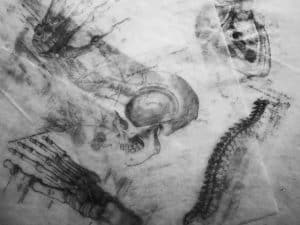~2000 words, approx 14 min reading time
Her teeth were sharp, and her patience long. She did not hold grudges, but she did not forget. She spoke to aged river rocks, and even if you wandered close enough to hear, your ears would fill with something like a good, thick soap, and you would only see her mouthing fervent words to the water-smoothed stones.
They say she was a witch. They say she was not. They say that whatever she was, it was a pity.
She was the only one who ever spoke to the bird. Her kin knew better, or perhaps she knew something they did not. Her kin said she was a fool, but they said it in hushed tones.
No one else ever got close enough to speak to it, let alone touch it. Because it flew, the people called it a bird, but they knew it was not. They could not have said what it looked like beyond that it flew, and it gleamed. This was why they feared it so.
When the bird came to take someone away, the people bowed their heads and prayed. Some prayed to gods they and their ancestors invented over centuries. Some prayed to the bird itself, pleading for mercy. Some prayed to nothing at all—their neighbors prayed; it seemed the thing to do.
It was curious that no one thought of the fact that praying had not worked once. That was how things were, in those days, in that place.
Even she prayed. Even she had sense enough not to question prayer aloud, although she wondered at it many times.
She did not bow her head.
They wonder if that was why she turned out so peculiar: when she was a babe, instead of huddling close to her mother’s breast, she opened her eyes wide and drank in the sight of the creature. Perhaps that was why the child’s teeth grew in pointed. The image of the bird lived in her bones.
Some shied away from her, of course. Closed their shutters and made protective signs across their hearts. Drew symbols by their windows, threw salt in their doorways. There are always mutters of witchcraft, curses, devilry.
But some of them were sturdy, sensible folk. She was of the same blood as they, and not even a child, not yet. And even if she were cursed, it was hardly her fault, they said. They loved her as one of their own, because she was.
Of course she knew she was strange. The children did not fear her at first, but her teeth did not look like theirs. Children, taught by their parents to hunt down anomaly, learn quickly what a girl with different teeth means. And she was always a bright thing, brighter even than most youth.
Bright, but odd.
They say they caught her in the act, although no one was sure it was exactly a sin. She had such wide eyes, it was hard to imagine her sinning at all—or perhaps it was quite easy. None of them wished their thoughts to dwell on her for long enough to decide.
They found her kneeling, black ink staining her tongue. Still just a child. She was voracious. The binding was all that was left, aside from a few scraps of paper fluttering to the ground. There were thin red lines about her mouth. She looked up at them. They wondered if this was what the bird had seen—those dark eyes, the irises nearly invisible, and her mouth open in something that might have been awe and might have been shame and might have been an innocent question.
They did not give her time to speak. She did not know what they would have done to her, had she not cried the bird’s arrival just as they jerked her to her feet. It took one of their grandfathers, that time.
That is the other thing they say about her. They say she knew the bird was going to take someone before it took them. Some of them even say she knew whom it was going to take, but if she did, she kept that to herself.
It did not always take someone when it flew by. Those times, she could not predict. Those times, she ran to the window, mouthing her prayers and staring reverently at the creature no one else dared see.
They did not trust her prayers. They were not sure she was praying it would leave.
They say she mourned, when one of them was taken, but her mourning was not the same as theirs. When they mourned, they murmured solemn, ancient words and sang songs in forgotten languages. They had no bodies to burn, so they would set a boat alight, piled with sturdy tools and honeyed almonds and things they loved. They sent it down the river, down the river to the unknown lands, down the river to the speaking stones (though few believed her when she said the stones spoke). They sent it with weeping and singing and praying, always praying.
She did not weep. She could not sing. She dared not pray. Not when the bird was too far to hear. She had her own ritual, performed alone.
When the last of the procession left the river, she went with silent steps to an eddy she knew well. It thought her a friend, or if not a friend, at least a companion. She thought it somewhat dull, but there was comfort in that. She spoke to the eddy and she spoke to the rocks beneath, and she lay a leather book at the riverbank, its pages still fluttering in the breeze. She tilted her head back to the sky, gave thanks, and fell to.
This was her sacred daily bread. She ate alone, or with the dead.
When she had finished, she took the binding and placed it in the river with reverence, in the center of the eddy, which knew its duty. It swirled the cover around and sent it down the river, borne by the voices of the stones.
They say she did this long before they started to cast mistrustful glances. She knew, perhaps, the inevitability of their mistrust.
The elders had known she was strange. She did not grow stranger as she aged. Rather, they discovered more of her strangeness with time. First the stories, then the death rites, then the river rocks. She went gray early. They said her wispy silver hair was a sign of devils. She was always tilting her head, as if listening for something. She gave a wild-eyed shout when she knew the bird would arrive; they had only moments to prepare. They feared her for this, and as their numbers dwindled, their fear surged.
It was impossible, after all, for them to go on this way. Each year the bird came more often, and left with empty talons less. And they were slow to change, slow to realize their need.
She grew older, wizened. She watched their grandmothers and grandfathers fly away, then their mothers and fathers, and she grew nervous. She still cried out her warnings, for the sake of those who had grown used to them, but she saw the narrowed eyes, heard the anxious whispers. Witchcraft, curses, devilry.
The story of her power faded. It might have been written, but if it had, she had consumed it.
Her supply of bread grew thin. She suspected they were hiding it. She sorrowed but did not blame them. Those who had spoken up for her when she was a babe were long since taken. Those who had been babes when she was a babe were withered and mistrustful, even of their own memories. Their children muttered. She herself had no children to defend her, and even if they had existed, they might not have spoken kindly.
They would not drive her out, she thought. But she heard them, wondering why she could tell of its arrival, wondering whether she called it. Wondering that she had been gray as long as they had been alive.
They did not see her mourn anymore. That she chose to do in secret. They would say what they would. She had no desire to prove her grief to them. She knew there was only so much time, only so many people the bird could take.
The bird took the other old ones, the ones who had known her from childhood. Then it took their children, those who wondered. Soon there were only babes left. Still she prayed, still watched the skies. Still she heralded the bird’s descent.
They shied away when she tried to bring them offerings of berries, nuts, roots, things that were foreign to her. They called her witch and fiend. She let them be.
She swallowed all the stories.
She asked the stones, and the eddy, how she would eat. They said to wait. She had a century of practice.
She searched while the babes slept. She found paper that had come loose from its binding, thin volumes she had missed. She savored them. She had once been able to stomach two, three in a day, but she was starving now, her belly shriveling. She ate little, but she lived.
They say the bird came weekly, while she starved. She prayed each day—she still feared to pray when it was gone, but she feared more that it would not hear her. Her clothing turned to rags. Her voice grew hoarse. Still it took the younglings, whom she still called to warn. She was ravenous. She could not mourn for them the way she wished.
The day came, as it must—the last babe gone, the last page in her hand. The river rocks urged her to drink of their cool, running water. The eddy bade her wait once more.
She flung her arms wide, turned her palms upward to display countless paper’s edge white scars, threw her old, rasping voice to the sky. She ate. She prayed.
It flew, and it gleamed.
They say it was a griffin; they say it was a phoenix. They say it was beautiful. Its feathers were of silver, like her hair. Its eyes were dark, devoid of irises.
It was not a bird.
She cried out, and this time there was no one left, she did not have to conceal her joy. She ran toward it as it descended in a long, slow spiral. Her bones were old and brittle; still she ran. She ran, stones tearing at her bare feet, jagged gashes in her filthy clothing, paper scraps falling from her mouth like baby teeth. Finally, finally, she howled, you have come to take me away.
And then it landed, and she saw by its talons a squirming, squalling creature, their thin arms struggling to wave. The babe could not even roll onto their stomach; they must have been starving for days. The final child, the last of them.
It had not come for her.
The babe’s mouth was open. They had not the strength to wail.
The silver animal did not turn its head. She saw its left eye blink once, twice. A drop of something blue and glimmering fell from the eye and ran into the feathers. It might have been a trick of the sun, the reflection off the dazzling creature.
She closed her eyes. She prayed for the child.
Its beak tore into her flesh like leather, like ink, like paper. Her blood was blue, her insides black. Her bones were feathered. Its talons ripped her stomach open; there was writing in the lining. It flayed her, licked up the words inside her skin. Carved her into ink blot pieces, ate her in four bites. The last page, still undigested in her gut, sliced its tongue. It was voracious.
When it had had its fill, a lock of silver hair remained. It cocked its head as if deciding. Her blood still about its mouth, it plucked the hair from the ground and placed it upon the chest of the babe. It flew.
The child gasped, blue upon his clothing. His eyes were open. He had seen the creature.
Mare Knaupp is a senior Creative Writing BFA student at Stony Brook University. They primarily work in fantasy with themes of queer and Asian American experiences. They love iced oat milk lattes, Neil Gaiman, spreadsheets, nineteenth-century British history, and Tchaikovsky (not necessarily in that order). This is their first publication.
Photo by Lane Jackman on Unsplash
Creator Spotlight:
Mare Knaupp
Author of “Paper Teeth”
1. What inspired you to write this story?
The idea of eating books is something that’s been with me for a very long time. I always tell people that after the right book, I feel nourished, like I’ve had a hearty, balanced meal. (I also used to eat paper as a kid because of The Tale of Despereaux.) Do I know how I got from “girl who eats books instead of normal food” to “personified river rocks and a kidnapping not-avian monster”? No, I do not.
2. What do you hope readers take from this story?
Everyone who’s ever read this story has a totally different interpretation of it, which I find both fascinating and flattering. I don’t want to be prescriptive about it, so I’ll keep my personal interpretation to myself, but I hope that people like the funeral bit, with the honeyed almonds. That one was my favorite.
3. To give other writers hope, would you mind sharing with us how many edits and/or submissions this story has been through?
I first workshopped this story in the spring of 2022. Since then it’s been through two rounds of edits and four submissions (including this one). Honestly, I was shocked that it only took four!
4. Recommend something to us! This could be a book, a short story, a video game, a project you’ve heard about, something you’re working on, etc. Anything that has you excited and that you want people to know about.
Neil Gaiman’s American Gods remains the delight of my soul. I recommend the extended ten-year-anniversary edition. If you want something more bite-sized, I love his story-poem “Bay Wolf” from the Smoke and Mirrors collection. Really, I recommend anything and everything by Gaiman, but those are my favorites.






